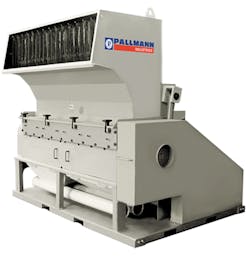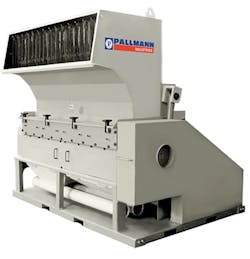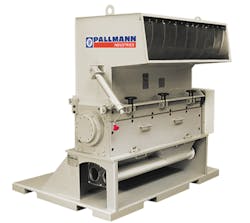Pallman boosts capabilities, options of latest granulators
Pallmann Industries has solidified its position as a full-spectrum granulator provider with the debut of its expanded line at NPE2018 in Orlando, Fla.
Previously, the company provided granulators that addressed specialty plastic materials, and the machinery was on the expensive side because of that niche, said Jeff Taylor, VP of sales for the company. "We weren't known for conventional plastics granulators," he said.
The new additions are the PP 25 series and PP 40 series. The granulators range from beside-the-press models to wide-body models for thermoformers and sheet producers, and heavy-duty recycling granulators, which include wet-grinding models with options such as feed rolls and auger-feed systems. Machines with auger-feed systems work well for PET bottles and light materials with a low bulk density by force-feeding the material into the rotor, he said.
Machine widths can vary from 20 inches to 78 inches, Taylor said.
Machines in the PP 25 series come with a 250mm-diameter rotor and have cutting chambers from 20 inches to 68 inches wide, he said.
The PP 25-series granulators feature a machined, bolted cutting chamber designed for durability. Quick access to the chamber allows for easy cleaning and quick screen changes. Rotating sidewalls reduce heat buildup, friction and fines.
Options on the series include sound insulation, a feed-roll system and a low-profile, beside-the-press layout.
The machines can handle waste and scrap from injection molding, extrusion, film manufacturing and thermoforming.
The PP 25 series comes in five models — 50, 75, 100, 140 and 175. Add a zero to each model to get the maximum width it can cut, as measured in millimeters. Capacity ranges from 265 pounds to 660 pounds per hour for the smallest model, to 660 pounds to 1,540 pounds per hour for the largest model.
The PP 40 series comes with a 400mm-diameter rotor and cutting chambers from 24 inches to 78 inches wide. Several rotor options are available, Taylor said.
The PP 40-series granulators are intermediate to larger central granulators. Built to perform the same applications as the PP 25 series, they feature the same cutting chamber and sidewall design as the PP 25 series, as well as the same options.
The 40 PP series comes in four models — 60, 90, 150 and 210. Again, adding a zero to the model number identifies its maximum cutting width (although the 210's width is 2,000). Capacity ranges from 550 pounds to 1,320 pounds per hour for the smallest granulator to 1,320 pounds to 1,980 pounds per hour for the largest model.
The two new machine series don't replace any current Pallmann granulator lines but, rather, complement the existing offerings. The current offerings are the PS-series 400, 600 and 800-1200, along with the PSRH and PSC granulators. Multiple models make up the current series, Taylor said.
The new machines are all built with machined weldments, he said, instead of castings. "We feel it is an extremely well-built, cost-effective piece of equipment."
Now, Pallmann machines can handle all types of waste — post-industrial, post-consumer and any other type of plastic scrap, at a more competitive price.
"These options, along with a wide selection of cutting chamber sizes, allow us to compete in the plastics industry with such a variety of sizes," he said. "Before we didn't have such a range of products to offer."
Pallmann will continue to provide smaller machines, but that's not the focus at this point, Taylor said. The company also has larger machines, such as the 60 series and 70 series. Those series may be upgraded soon, as well.
"We wanted to provide an extensive product range to the plastics industry, and we feel our new machines do that," he said. "Also, we wanted to match the market prices for this type of granulator.
"We didn't have these other sizes before. So, it's complementing what we already had."
Pallmann's new granulator lines are made in Mexico.
Pallmann is aiming to be a more comprehensive provider to the plastics industry in general. Its NPE booth theme was "Pathway to Powder." It featured five steps: shredding; granulating, pulverizing, fine pulverizing and micro pulverizing.
"The bottom line is, we're trying to bring in the complete offering that a plastic injection molder could use, or a thermoformer could use, or a blow molder," Taylor said. "In other words, there's something for everybody in the machine offerings."
The company provides systems designed according to customer requirements, as well as standard products. It aims for the successful preparation of all soft to medium-hard, brittle, tough, elastic, fibrous, sticky and difficult-to-process materials.
Allan Gerlat, correspondent
Contact:
Pallmann Industries Inc.,
Clifton, N.J., 973-471-1450,


